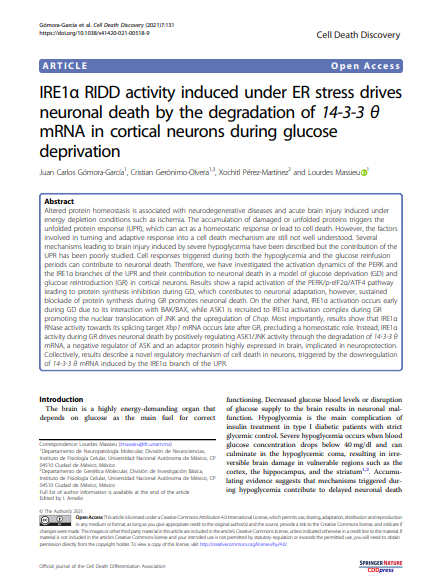IRE1α RIDD activity induced under ER stress drives neuronal death by the degradation of 14-3-3 θ mRNA in cortical neurons during glucose deprivation

Fecha
2021-06-03Autor
Gómora-García, Juan Carlos
Gerónimo-Olvera, Cristian [Univ Mayor, Fac Sci, Ctr Integrat Biol, Chile]
Pérez-Martínez, Xochitl
Massieu, Lourdes
Ubicación geográfica
Notas
HERRAMIENTAS
Acceda a títulos restringidos
¿Cómo descargar?Resumen
Altered protein homeostasis is associated with neurodegenerative diseases and acute brain injury induced under energy depletion conditions such as ischemia. The accumulation of damaged or unfolded proteins triggers the unfolded protein response (UPR), which can act as a homeostatic response or lead to cell death. However, the factors involved in turning and adaptive response into a cell death mechanism are still not well understood. Several mechanisms leading to brain injury induced by severe hypoglycemia have been described but the contribution of the UPR has been poorly studied. Cell responses triggered during both the hypoglycemia and the glucose reinfusion periods can contribute to neuronal death. Therefore, we have investigated the activation dynamics of the PERK and the IRE1 alpha branches of the UPR and their contribution to neuronal death in a model of glucose deprivation (GD) and glucose reintroduction (GR) in cortical neurons. Results show a rapid activation of the PERK/p-eIF2 alpha/ATF4 pathway leading to protein synthesis inhibition during GD, which contributes to neuronal adaptation, however, sustained blockade of protein synthesis during GR promotes neuronal death. On the other hand, IRE1 alpha activation occurs early during GD due to its interaction with BAK/BAX, while ASK1 is recruited to IRE1 alpha activation complex during GR promoting the nuclear translocation of JNK and the upregulation of Chop. Most importantly, results show that IRE1 alpha RNase activity towards its splicing target Xbp1 mRNA occurs late after GR, precluding a homeostatic role. Instead, IRE1 alpha activity during GR drives neuronal death by positively regulating ASK1/JNK activity through the degradation of 14-3-3 theta mRNA, a negative regulator of ASK and an adaptor protein highly expressed in brain, implicated in neuroprotection. Collectively, results describe a novel regulatory mechanism of cell death in neurons, triggered by the downregulation of 14-3-3 theta mRNA induced by the IRE1 alpha branch of the UPR.
URI
https://repositorio.umayor.cl/xmlui/handle/sibum/9191https://www.ncbi.nlm.nih.gov/pmc/articles/PMC8175356/pdf/41420_2021_Article_518.pdf
https://doi.org/10.1038%2Fs41420-021-00518-9
https://www-nature-com.bibliotecadigital.umayor.cl:2443/articles/s41420-021-00518-9.pdf
Coleccion/es a la/s que pertenece:
Si usted es autor(a) de este documento y NO desea que su publicación tenga acceso público en este repositorio, por favor complete el formulario aquí.